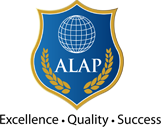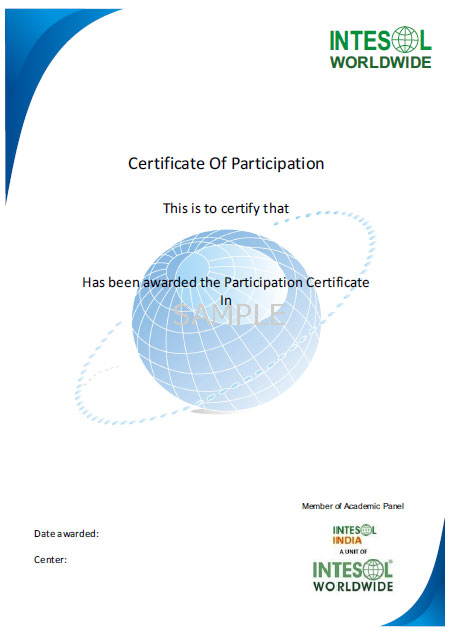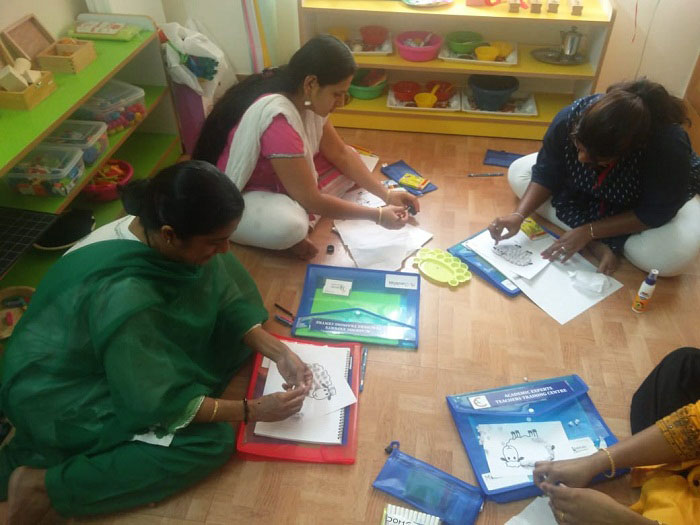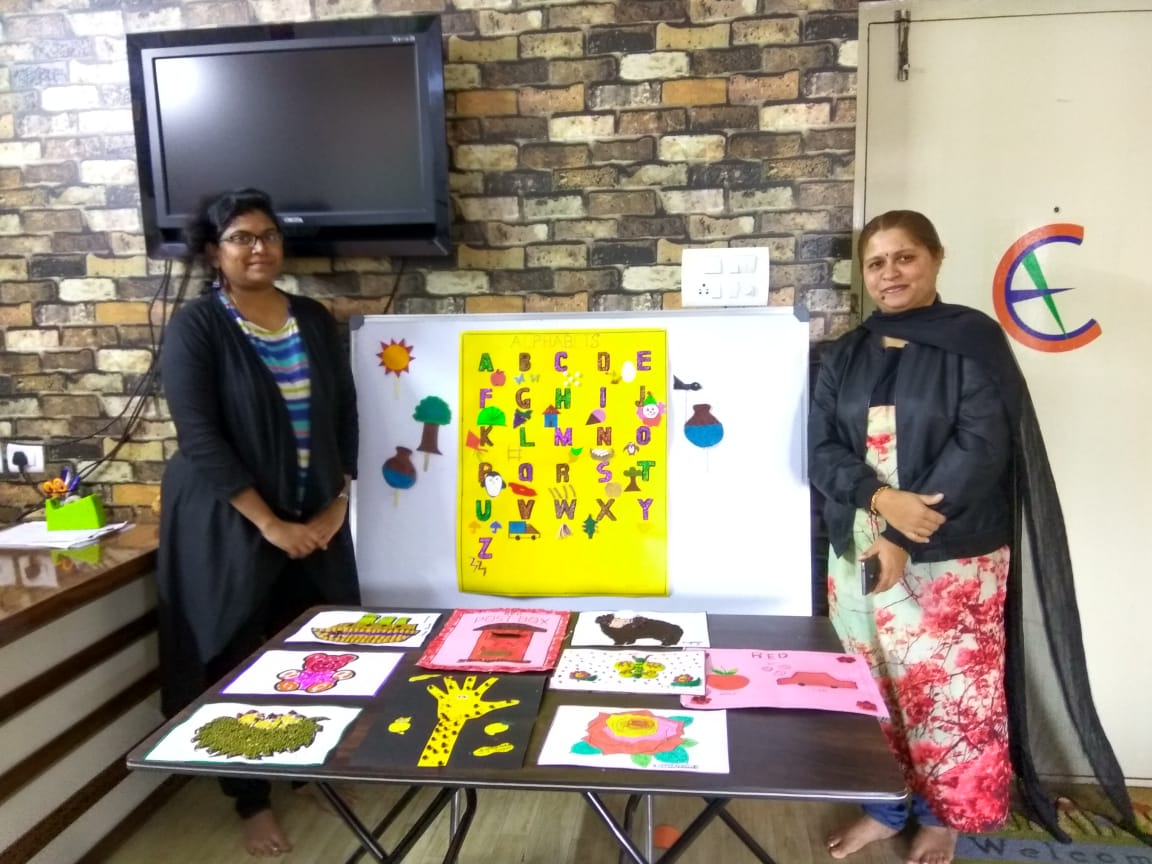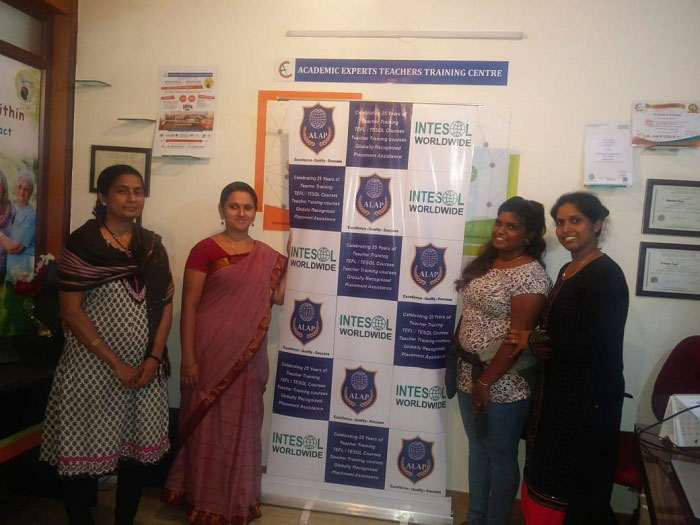
TEFL & Teacher Training Course in Bangladesh
About INTESOL Worldwide / INTESOL India
INTESOL Worldwide, was founded in UK in the year 1993 with the belief that anyone possessing the passion to teach, the skills to express themselves clearly, and the desire to make a difference in the lives of others should be given the opportunity and encouragement to gain a professional certification in the TEFL (Teaching English as a Foreign Language) / TESOL (Teaching English to Speakers of Other Languages). Acquiring the highest level of accreditation on its courses from the prestigious accreditation body ALAP from UK the institute has fast paced its presence in almost twenty countries, thus giving quality education and skilful training to all its students till date. Understanding the need of efficient and effective teaching force in the education world of the Asian countries the institute through its India chapter – INTESOL India has forayed into the space of Teacher Training Courses and has developed need based and skill based various teacher training programs which has now become the benchmark of its success in the field of teaching and training.
Teacher Training Course (TTC)
All courses in INTESOL are designed with complete conviction so that it can completely educate the to-be teachers in the best possible way, making them potent enough to upgrade their skills. The knowledge and professional training infuse the teachers with great confidence to acquire a respectable teaching job in any corner of the world with the highest credibility. And with that focus in mind and specially the education system in India, Asia and Middle –east as a whole we at INTESOL have developed various teacher training courses that take care of the elementary teaching degree for our aspirant teachers. The courses include Pre and Primary Teacher Training Program which caters to age group of 2-13 years where one learns both the teaching requirements of pre-primary and primary sections. Nowadays pre schools, play schools and preparatory schools are mushrooming all over the cities but the question is whether they have the adequately trained teaching force. Our course aims to eradicate that problem for the schools by imparting a course that helps the teachers to aim at the holistic development of a child.
The developmental years of any child are the beginning years where the teacher needs to be aware of the psychological needs of the young learners and thereby educate them in the manner which is activity filled and inspired from practical life situations. It is often seen that children learn by doing and keeping that in mind we have infused the Montessori methodologies with modern education system and formulated our Montessori Teacher Training Program. The course contains a large variety of materials for the refinement of sensory perception and the development of literacy and mathematical understanding along with self expression, development of self confidence and intellectual independence of students.
Nursery class plays the enormous role of laying an unaltered foundation for further learning through a series of supervised experiences for young learners. It is often seen that the teachers have the willingness to teach young kids but don’t have the adequate skills to channelize their learning towards the holistic development of the child. Our Nursery Teacher Training program is developed by such educators and academicians who have years of experience in understanding and handling child psychology and thus they have prepared a course which meets the need specific demands of the job. The course specifically focuses on how to teach young learners, child psychology and behaviour, giving proper feedback and classroom management skills etc.
English Pro Courses
English is today the lingua franca of the world and a Global Language. The Importance of the language has gained impetus from the time international trade and commerce has advanced with the dawn of 21st century. The need to learn English as a tool of communication is the need of the hour and with this vision in mind INTESOL has developed a bouquet of courses to develop the English communication skills of people from various walks of life which includes – school students, fresh graduates, corporate executives, housewives, sales and marketing executives, principals of educational institutes, entrepreneurs, teachers and trainers alike. The courses are broadly categorized in three levels – English for General Purpose, English for Academic Purposes and English for Business Communication. It is a perfect blend of theoretical as well as practical learning through the myriad nature of activities and practices that are included in the course curriculum. It is guaranteed at the end of the course every individual will come out with improved and effective skills of communication.
On completing the course successfully, the candidates are accredited with a globally recognized certificate that will make them eligible for teaching inside the country and abroad. So if you are interested to enjoy the travel along with a lucrative teaching career Enrol now! Grab the opportunity right away!
INTESOL India and Bangladesh
English as a language has an undeniable role in human capital development in an increasingly globalised world, and is now widely accepted as having immense potential for individuals and societies. In the global economy the acceptance of English as central to accessing the global market is imperative. Consequently many countries in Asia, for example, the South East Asian countries, where English has been used as a foreign language for decades, have adopted the teaching and learning of English in their education policies in response to the realities of a more globally connected world. In Bangladesh the scenario is different. With the backdrop of persistent nationalistic favouritism towards Bengali, English is still widely an area specific language confined to academia and an important symbol of socio – intellectual elitism and prestige. This ongoing friction between Bengali and English, both in policy and practice, and in the cultural temperament in the nation has left deep scars in the formation of an acceptable language till date.
With the recent Education Commission Policy currently English is taught as a compulsory subject from Classes 1 to 12 in the national curriculum. With over 17 million children learning English, Bangladesh boats one of the largest primary second language English populations in the world. Inspite of this compulsory education students’ performance in English is generally still found to be very poor such as that average English language skill level of a University student is equivalent to the Class 7 level. This is the crux of INTESOL’s presence in Bangladesh as it aims to develop the English communication skills of the country through its various Communicative Language Training (CLT). Our target group is both the present and future workforce of the country. INTESOL will highlight the importance of learning English by introducing effective methodology of English Language teaching through training, In-class and Online courses, workshop and developing institutional capacity to deliver future programs and courses. INTESOL will optimise the practice of using English as medium of instruction with most departments from schools to colleges to public sector to private sector by introducing international teaching and training programs and fundamental and foundation and advanced level courses on English language to develop English Language skills to compete with local and global demands.
About INTESOL – Bangladesh Office
iii Limited is an education based company in Bangladesh. This company serves Bangladesh Govt., Police, Army, BGB, Army-run educational institutions as soft-skills development partner. It also work with INTESOL India to offer international standard courses on different skills including English Language, Teachers' Training, Corporate Training, Young Learners' English, All-Rounder English Courses for JSC/SSC/HSC and University Students. Mr. Muhammad Yeasir is working as a Country Director of INTESOL India for Bangladesh. He is a Certified TESOL trainer, Writer and Online Teacher.
With the joint collaboration of INTESOL India a unit of INTESOL Worldwide and iii the future of the country will be established on global lines so that the citizens of the country can compete for local jobs and opportunities abroad.
Students will be scrutinised and enrolled for regular classroom and online courses and evaluation will take place through assignment submission. Through the various centres of iii students can enrol in the programs and reap the opportunity to attend special workshop sessions at the INTESOL centres in India. The international workshop will not only rake their confidence but will also give them an out of the country exposure and thus prepare them for jobs abroad. Final certification will be from the Indian and UK centre of INTESOL.
Please check the following link for the same. You can take the information from there: https://www.intesolindia.com/accrediations.php
- English has become a global mode of communication, therefore, the demand for efficient English trainers is escalating every minute leading to a vast number of job opportunity for the Certified English language trainers across the globe.
- INTESOL provides an opportunity to feel, enjoy and live a life of an English language teacher while travelling throughout the world.
- INTESOL certification provides a chance for each and every individual to come out of their old career and enjoy a new beginning as an English Language teacher.
- Being a teacher is not like any other monotonous profession and involves a lot of job satisfaction, learning, self motivation and development, guiding and mentoring of the students. This is an attractive and challenging career option for those professionals who want to escape the corporate life and also for those who want to become a successful English language teacher while travelling worldwide.
- The most promising reason to become a TEFL certified teacher is to get into a process of learning and delivering knowledge while enjoying a handsome salary package leading to a decent and healthy lifestyle.
- Most often people do get jobs in a private language school/ in a kindergarten/ Montessori/ primary/ secondary/ elementary/ junior high/ middle or high schools after they complete the certification course successfully but it is not hard to get a job of teaching in an organization as a soft skills trainer or as a lecturer in a college. But, to get a decent job in a university, a person has to be equipped with higher qualification and years of teaching or professional experience to match up the requirement of the employer. Some jobs are also available which requires minimum qualification like a job of an assistant language teacher in a public school or state school. A TEFL certification can definitely help an individual to get such a job and climb up to a successful career.
- Apart from English language teaching and training jobs there are various other job opportunities namely communication trainers, English improvement mentors, soft skills trainers jobs that a TEFL certified trainer can look for.
- The employment opportunities of an English language teacher are spread across the border. Along with Asia, there are other counties like European nations, Latin American countries, Gulf States and many more are offering lucrative salaries along with other necessary facilities for the English language trainers to establish a good standard of education across the countries.
- Apart from the regular salary, an international teaching job often comes with lucrative bonus and various benefits like free food and accommodation, health or medical insurance, different bonus, incentives and many more.
- For all of our students, TEFL has become a life changing experience with handful of opportunities that changed their life significantly to push them towards a healthy and decent lifestyle full of excitement and learning.
- For students enrolling in our Teacher Training Course including Pre and primary Teacher Training Program, Montessori Teacher Training and Nursery Teacher Training can find a galore of oppurtunities to work with the elementary students both in country and abroad. The fresh teachers and experienced teachers can both apply for jobs to teach children between 2-13 years of age and can be assimilated in any kind of schools international corresponding to the system of education the country follows.
- The English Pro Courses will enable the students, fresh graduates, working professionals, teacher, trainers, principals, corporate executives and people from all walks of life to improve not just their communicative skills but over all personality as well. With improved knowledge will come confidence and the courage to face interview boards in Bangladesh as well as abroad and the trainees will find themselves in lucrative jobs worldwide. A good communication skill in English is the need of the day and an imperative requirement for any international job.
Courses
TEFL/ TESOL Courses : Online Mode of Learning
TEFL/ TESOL Program – Our flagship product TEFL(Teaching English as a Foreign Language) / TESOL (Teaching English to Speakers of Other Language) is the international course to teach English and other subjects in the language English. For those who dream to teach and travel abroad can open their wings now and equip them with a degree that is mandatory to teach abroad. With opportunities available globally for teacher exchange programs one can be a teacher or trainer in any part of the world and satiate their desire to see new destinations and experience new cultures. The course is available in In-class mode of learning across various locations in India and can also be done from the relaxed confines of the home by our extensive online mode of learning which comes with tutor support for every individual student. The course teaches the core communication skills of the English language such as reading, writing, speaking and listening and also focuses on grammar, phonetics, classroom management, teaching aids, methods of error correction and evaluation techniques along with the knowledge of teaching English as a global language both for academic and specific purposes. With a TEFL/ TESOL degree in hand one can not only earn a lucrative salary but get the experience of a lifetime.
The Course comes in four levels:
120 Hour of TEFL Certificate Program with Specialization in TEYL ( Teaching English to Young Learners) - This is the minimum accepted certificate course for teaching English abroad. This TEFL course includes a module on teaching young learners, so you will be fully equipped with the skills that are in high demand by TEFL employers worldwide.
Eligibility - No prior qualifications or experience is required. Graduation degree from a recognized University, fluent English, determination and aptitude towards teaching is expected.
Duration – 5 months (Extension if required can be taken with prior permission and with a valid reason beyond such request)
Course Curriculum –
UNIT 1: STUDY SKILLS
(Not assessed) – How to organize your study time
• Personal motivation
• Planning and organizing study time - timetabling, study periods, realistic planning
• Study techniques - making notes, concept maps, nuclear notes, mnemonics
• 5 step reading techniques - selection, recognition, extraction, organization and transfer of information
How the course works - role of tutor, tutor assessed and self-study tasks
UNIT 2: THE STUDY OF ENGLISH
Module 1
o Deductive Analysis and use of grammars
o Parts of speech and grammatical terminology
o The tense system, reported speech, active and passive
Module 2 o Elements of pronunciation: intonation including rising and falling tones, sentence stress, weak forms o Sounds of the language/phonology - word stress, schwa sound, phonemic chart o Teaching a ‘pronunciation point’
Module 3 o Lexis selection: frequency and appropriacy o Lexis formation: synonyms and antonyms, word stems, parts of speech including prefixes and suffixes
UNIT 3: THE TEACHING AND LEARNING OF ESOL
Module 1
o Overview of ESOL issues
o Being a caring teacher, involving students, using realistic language, keeping the students attention, teacher talking time, correction, levels in ESOL teaching, visual aids, use of mother tongue
o Teaching for exams: Cambridge ESOL, Professional English Examinations, TOEFL etc.
o The role of grammar, classroom techniques, one to one teaching
Module 2
o Listening and Reading: skills and the textbook, different kinds of listening, available materials
o Reading in a foreign language; types of reading, types of texts, writing comprehension questions, stages of reading activities, designing reading activities
Module 3
o Speaking and Writing: what it’s like speaking in a foreign language, setting up speaking activities, types of speaking activities, discreet sound teaching, issues in writing, the nature of writing as a skill, organizing and planning writing activities
o Visual Aids: study of all the audio-visual aids available
o Production of your own flashcards and aids to be used with a simple flannel graph
Module 5
o Error: looking at authentic student errors, classifying them, using a correction code, producing remedial exercises and improving your own practice.
UNIT 4 CLASSROOM MANAGEMENT AND ASSESSMENT
Module 1
o Learning and teaching: seating, name, teacher talk time, use of questions, ways of differentiating, managing interruptions, learning styles
o Lesson Stages and Plans
Module 2
o Parts and stages of a lesson
o Time management, group, needs analysis, writing aims and objectives, predicting problems, sample lesson plans at a range of levels
BONUS UNIT: YOUNG LEARNERS (NOT ASSESSED)
Subjects covered in this unit are:
o Differences between the ways in which adults and children learn
o Features in the stages of development of Young Learners
o Classroom management strategies for use in the Young Learners classroom
o Teaching techniques for use with Young Learners
Eligibility - No prior qualifications or experience is required. Graduation degree from a recognized University, fluent English, determination and aptitude towards teaching is expected.
Duration – 5 months (Extension if required can be taken with prior permission and with a valid reason beyond such request)
Course Curriculum –
UNIT 1: STUDY SKILLS
How to organize your study time?
Ø Personal motivation
Ø Planning and organizing study time; timetabling, study periods, realistic planning
Ø Study techniques; making notes, concept maps, nuclear notes, mnemonics
Ø 5 step reading techniques; selection, recognition, extraction, organization and transfer of information
Ø How the course works; role of tutor, tutor assessed and self-study tasks
UNIT 2: THE STUDY OF ENGLISH
Module 1
Ø Deductive Analysis and use of grammars
Ø Parts of speech and grammatical terminology
Ø The tense system, reported speech, active and passive
Module 2
Ø Elements of pronunciation: intonation including rising and falling tones, sentence stress, weak forms
Ø Sounds of the language/phonology; word stress, schwa sound, phonemic chart
Ø Teaching a ‘pronunciation point’
Module 3
Ø Lexis selection: frequency and appropriacy
Ø Lexis formation: synonyms and antonyms, word stems, parts of speech including prefixes and suffixes
UNIT 3: THE TEACHING AND LEARNING OF ESOL
Module 1
Ø Overview of ESOL issues
Ø Being a caring teacher, involving students, using realistic language, keeping the students attention, teacher talking time, correction, levels in ESOL teaching, visual aids, use of mother tongue
Ø Teaching for exams: Cambridge ESOL, Professional English Examinations, TOEFL etc.
Ø The role of grammar, classroom techniques, one to one teaching
Module 2
Ø Listening and Reading: skills and the textbook, different kinds of listening, available materials
Ø Reading in a foreign language: types of reading, types of texts, writing comprehension questions, stages of reading activities, designing reading activities
Module 3
Ø Speaking and Writing: what it’s like speaking in a foreign language, setting up speaking activities, types of speaking activities, discreet sound teaching, issues in teaching writing, the nature of writing as a skill, organizing and planning writing activities
Module 4
Ø Visual Aids: study of all the audio-visual aids available
Ø Production of your own flashcards and aids to be used with a simple flannel graph.
Module 5
Ø Error: looking at authentic student errors, classifying them, using a correction code, producing remedial exercises and improving your own practice.
UNIT 4 CLASSROOM MANAGEMENT AND ASSESSMENT
Module 1
Ø Learning and teaching; seating, name, teacher talk time, use of questions, ways of differentiating, managing interruptions, learning styles
Ø Lesson Stages and Plans
Module 2
Ø Parts and stages of a lesson
Ø Time management, group, needs analysis, writing aims and objectives, predicting problems, sample lesson plans at a range of levels
Eligibility - No prior qualifications or experience is required. Graduation degree from a recognized University, fluent English, determination and aptitude towards teaching is expected.
Duration – 8 months (Extension if required can be taken with prior permission and with a valid reason beyond such request)
Course Curriculum –
UNIT 1: STUDY SKILLS
How best to organize your study time?
Ø Personal motivation
Ø Planning and organizing study time; timetabling, study periods, realistic planning
Ø Study techniques; making notes, concept maps, nuclear notes, mnemonics
Ø 5 step reading techniques; selection, recognition, extraction, organization and transfer of information
Ø How the course works; role of tutor, tutor assessed and self-study tasks
UNIT 2: THE STUDY OF ENGLISH
Module 1
Ø Grammar
Ø Tasks on the understanding of grammar, tense & structure
Ø To be completed with the use of a grammar book.
Module 2
Ø Phonetics
Ø Tasks relating to the phonetic alphabet, stress & intonation.
Module 3
Ø Lexis
Ø Tasks relating to the presentation of vocabulary, compound words, word stems, language appropriacy & frequency.
UNIT 3: THE TEACHING AND LEARNING OF ESOL
Module 1
Ø Basic Principles
Ø Answers from your own experience and the course materials on:
1) the blocks which may prevent learning
2) motivation
3) communicative competence.
Module 2
Ø Reading and Listening
Ø Tasks based on exploitation of authentic materials i.e. magazines, newspapers, radio broadcasts etc.
Module 3
Ø Speaking and Writing
Ø Tasks based as above but with a more productive bias
Ø Getting your students to produce language
Module 4
Ø Visual Aids: Study of all the audio-visual aids available
Ø Production of your own flashcards and aids to be used with a simple flannel graph
Module 5
Ø Error: looking at authentic student errors, classifying them, using a correction code, producing remedial exercises and improving your own practice
UNIT 4: LESSON PLANNING
Module 1
Ø Classroom Management
Ø Task relating to student teacher relationships and how to achieve genuine communication inside and outside the classroom
Module 2
Ø Lesson Stages and Plans
Ø Timing, warm-up, input, practice and production stages of lessons
UNIT 5: ESOL SKILLS FOR LIFE
Ø Introduced to the UK national ESOL Skills for Life program and the Adult ESOL Core Curriculum
Ø Understand the differences between ESOL Skills for Life and other existing ESOL courses
Ø Identify the aims of the ESOL Skills for Life course and the needs of the target learners
Ø Assessment procedures developed for the ESOL Skills for Life program
Ø Know where to get materials and further information for the ESOL Skills for Life courses and assessment
UNIT 6: BUSINESS ENGLISH
Ø Business English in relation to EFL/ESOL
Ø How to carry out a Needs Analysis
Ø Matching course content to target group
Ø Creating materials for Business English
Ø How to write a Business English syllabus
UNIT 7: YOUNG LEARNERS
Ø Differences between the ways in which adults and children learn
Ø Features in the stages of development of Young Learners
Ø Classroom management strategies for use in the Young Learners classroom
Ø Teaching techniques for use with Young Learners
Eligibility - No prior qualifications or experience is required. Graduation degree from a recognized University, fluent English, determination and aptitude towards teaching is expected.
Duration – 12 months (Extension if required can be taken with prior permission and with a valid reason beyond such request)
Course Curriculum-
UNIT 1: BEING AN EFFICIENT DISTANCE LEARNER
Study skills
• Managing your time efficiently
• Organizing your schedule
• Note-taking
• Overcoming the loneliness of the distance learner
• How this course works
UNIT 2: SEMANTICS/LANGUAGE AWARENESS
• Module 1
• Form and function
• Lexical meaning: denotation, connotation, synonyms, antonyms, hyponyms, polysemes, homonyms
• The importance of collocation
• Time and tense
• Presents
• Past tenses
• Futurity
• Conditionals and hypothetical meaning
Module 2
• Progressive and perfect aspects: form and meaning
• The progressive aspect
• Form and meaning of the perfect aspect
• Sentence structure: units of language; sentence elements
Module 3
• Negatives: types of negation
• Questions: question types
• Modality
• Word classes and phrases
• Adjectives and adverbs
• Determiners
Module 4
• Prepositions and multi-word verbs
• Word formation: morphemes
UNIT 3: PHONOLOGY AND PHONETICS
Module 1
• Attitudes to pronunciation teaching
• Terminology in phonology and phonetics
• Organs of speech
• Phonemes
• The phonemic chart
• Consonants: description and practical applications
• Vowels
• Cardinal vowels chart
• Diphthongs
• Place of articulation
• Research based project
• Materials evaluation
Module 2
• The syllable
• Consonant clusters
• Strong and weak syllables
• Word and sentence stress
• The ‘schwa’ sound
• Marking stress
• Primary and secondary stress
• Tendencies in word stress
• Research based project
• Weak forms
• English as a time-stressed language
• Features of connected speech
• Materials evaluation
Module 3
• Spoken and written forms
• Intonation
• Tone units
• The tonic syllable
• Pitch movement
• Intonation and discourse
• Teaching and learning intonation
• Research based project
• Pronunciation and ‘which’ English
• Are native speakers the best ESOL teachers?
• Strategies for personal development in the teaching of pronunciation
UNIT 4: PSYCHOLINGUISTICS
Module 1
• Attitudes toward language teaching
• Good language learners: characteristics and strategies
• The teacher’s influence on learner strategies
• Cognitive strategies
• Metacognitive strategies
• Communication strategies
• Social strategies
• Learner training
• Learner training materials evaluation
• Research based project
• Observation task
Module 2
• Motivation
• Motivational factors
• The teacher’s influence
• Motivational differences
• Learner styles
• Multiple Intelligence Theory
• Research based project
Module 3
• First language acquisition: behaviorism, interactionism
• Second language acquisition: behaviorism, information processing, interactionism
UNIT 5: DISCOURSE ANALYSIS
Module 1
• Brief history of Discourse Analysis: structuralism, sociolinguistics, post-modernist
• Coherence in language
• Cognitive interpretation of language: Schema Theory
• Social context of language
• Political context of language
• Approaches to encourage coherence in discourse (practical case)
• Discourse communicative methodology and student centeredness
Module 2
• Teacher talk in the ESOL class
• Turn-taking research
• Text structure: cohesive devices (lexical cohesion, tense concordance, pronoun referencing, article referencing, conjunctions, ellipsis, substitution, parallelism)
• Cohesive devices in the classroom: a practical case
• Differences between written and spoken language
• Discourse intonation
• Teaching discourse intonation in the ESOL classroom
• Transcribing spoken language
UNIT 6: SYLLABUS DESIGN
Module 1
• Pros and cons of a syllabus
• Types of syllabus
• Needs analysis
• Planning the syllabus
• Action research project
UNIT 7: MATERIALS DESIGN AND EXPLOITATION
Module 1
• Evaluating course books
• Exploiting published materials
• Resources and technology
• Using the internet
• Adapting authentic materials
• Action research project
UNIT 8: METHODOLOGY
Module 1
• Second Language Acquisition Theory
• Behaviorism versus cognitism
• The natural approach
• The lexical approach
• More recent approaches and views on the teaching-learning relationship
UNIT 9: TEACHER DEVELOPMENT
Module 1 • Factors that contribute to teacher demotivation
• A basis for professional progress
• Peer training
• Sources of valuable feedback
• Meetings as a forum for sharing reflections and further development
• Practical ideas for moving forward as a teacher: practical case
UNIT 10: ENGLISH AS A WORLD LANGUAGE
Module 1
• English as an international language
• English in the country you wish to teach and research project
• Standard English and varieties of English
• Teaching language and culture
• Teaching in monolingual and multilingual classes
• Implications for teaching: practical cases
TESOL - Teaching English to Speakers of Other language or TEFL – Teaching English as a foreign language is not just the flagship product of INTESOL but its identity as well. This is the perfect option to gain an internationally recognised TEFL certification accredited by leading ELT body ALAP, UK and gain valuable teaching practice before going on for a teaching job worldwide. One can choose from the variety of locations where the training program will be conducted. The course module consists of grammar, phonetics, lexis, teaching and learning of ESOL, four communication skills of reading , writing, speaking and listening, visual aids, error checking, lesson planning etc. When you begin teaching abroad you will get opportunities to teach both young learners and adults so this TEFL course include modules on both Teaching Young Learners and Business English Teacher Training modules so that the teachers are fully equipped with the skills that are in high demand with TEFL employers all over the world. With our experienced and adequately qualified trainers you will learn the best ways to make classes fun and engaging for both you and your students, ensuring that the overall experience an unforgettable one. The 140 Hour TESOL course is externally accredited, meaning the learning and teaching methods have been scrutinized externally to meet industry standards. INTESOL has a strong network internationally with branches all over the world and with the multitude of relationships we have developed with schools and recruiters in TESOL employment hotspots, we will also help you to get placed in the best teaching jobs.
Eligibility – No prior qualifications or experience is required. Graduation degree from a recognized University, fluent English, determination and aptitude towards teaching is expected.
Course Period – 140 Hour / 3 weeks with Teaching Practice
Course Dates – All the year round
Course Curriculum –
Introduction to TESOL
Language Acquisition
• Second Language Acquisition
• Acquisition Vs Learning
EFL teaching
• Methodologies and Approaches
Learners
• Language Learners and their levels
Grammar and Phonology
Grammar
• The structures
• Contextualizing Grammar
Phonology
• Segmental
• Supra-segmental
Language Skills
• Teaching listening
• Teaching reading
• Teaching speaking
• Teaching writing
• Warmer and Context Setting
• Theatre techniques
• Teaching language using songs and music
Classroom Management
• The components
• Ways to master classroom management
• Case Studies
Lesson Planning
• Components of lesson planning
• Benefits of lesson planning
• Sample Lesson Plans
Teaching Adults
• Why Is Teaching ESL to Adults Any Different?
• Malcolm Knowles 5 Principles
• Activity
Teaching Young Learners
• Difference between teaching Adults and YL
• Characteristics of YL
• How to teach YL
Teaching Aids
• Audio Visual and Simple Aids
• Technical Aids
Error Correction
• Psycholinguistics
• Ways of marking error
• Dynamics of quality feedback
Business English
Teaching Practice
As globalization has struck the world market hence everything has become business oriented. Communication plays an important role in any global operation. So the demand for learning business English has increased big time. INTESOL offers 6 month of Teaching Business English course to guide the interested candidates looking for a career in teaching. The course guides the candidates with detail knowledge about how teaching business English is different from traditional English teaching and how effective result can be produced, the procedures, the methodologies and the techniques. The certificate which is awarded on completion can surely add up huge credibility for the professional career. Pursuing the course can open up opportunity to work as a corporate trainer across the world and earn a living to crave for.
Course Period – 4 Months
Course Curriculum –
UNIT 1
Types of E.S.P. – this looks at the purpose for which the student needs to learn English
TASK – Identifying learners.
UNIT 2
Class profiles, needs analysis and motivation
TASK – Identifying learner groups and their motivation. Ways of increasing motivation and maintaining motivation.
UNIT 3
Testing and Examinations – looking at placement and diagnostic tests, progress tests, types of testing etc.
TASK – Test design, marking and monitoring progress
UNIT 4
English for Academic Purposes
TASK – Looking at different types of exercise and identifying the purpose of each; note writing etc.
UNIT 5 English for Occupational purposes – looking at anaphoric reference, substitution, ellipsis, coherence markers etc.
TASK – Planning lessons on note-taking, telephone skills etc.
UNIT 6 Lesson and Syllabus planning – choosing textbooks, designing your own materials.
TASK – Designing a syllabus and detailed lesson plans from given class profiles or your own if you have access to students. There are many examples of exercises and texts given throughout the course.
Teaching English to Young learners –
Teaching to young learners is a tough task and the task becomes tougher when it comes to language teaching. Teaching English to kids requires serious skills and knowledge. INTESOL features a detailed course on Teaching English to Young Learners for guiding early childhood educators with teaching methods. It is important for the teachers to grab the attention of the students and make them interested in learning by creating a suitable learning atmosphere. It is also important to make learning as much fun as possible. The course helps the teaching aspirants with ideas and methodologies. The certificate which is awarded on completion will broaden chances for a successful career abroad. Understanding the gravity of the job role is important and this course plays that part effectively. The teacher must understand the difference between teaching English to an adult & to a child and also needs to analysis why it is different. The course guides thoroughly as it deals with the most sensitive stage of learning.
Course Period – 4 Months
Course Curriculum –
UNIT 1 – THE YOUNG LANGUAGE LEARNER
Module 1 – Characteristics of a young language learner
Module 2 – Characteristics of a young learner’s teacher
UNIT 2 – TEFL IN THE PRIMARY (ELEMENTARY) CLASSROOM
Module 1 – A comparison of young and adult learners of English
Module 2 – Error correction and real communication with young learners
Module 3 – Activities for young learners
UNIT 3 – YOUNG LEARNERS AND MATERIALS
Module 1 – Exploiting young learners materials
Module 2 – Curriculum design for a young learners class
Module 3 – Language immersion opportunities
UNIT 4 – TEACHING TEENAGERS
Module 1 – Creating a communicative teen class
Module 2 – Managing teenagers
Teaching English Grammar
Grammar holds a huge importance for any language learning. Hence knowledge in grammar could be crucial for EFL teachers to teach English as a foreign language. Teaching English grammar requires specialized knowledge to make an effective effort and to produce goal oriented result. The teachers need to be equipped with vast knowledge to teach grammar rules and exceptions. INTESOL offers 4 months of intensive course on teaching English grammar that includes detailed information and knowledge to produce effective grammar lessons and make the global English teaching career more worthy. As it is never easy for someone to learn the grammar of a new language hence the teacher needs to give some serious effort. He or she must have a clear idea about how to teach English grammar and the course is dedicated to throw light on this. The certificate which is globally accepted, awarded on completion of the course can be effective to add optimum value to the credibility of a teacher.
Course Duration – 4 Months
Course Curriculum –
Phase 1
• What is grammar
• The importance of teaching Grammar
• Principles of teaching grammar
• Types of grammar
Phase 2
• Word Classes
• Different kinds of noun
• Adjectives
• Verb and types of verbs
• Adverb
• Determiners
• Preposition and its uses
• Conjunction
• Clauses and Phrases
Phase 3
• Auxiliary verbs and Modal verbs
• Functions of the English auxiliary verbs
• Modals
Phase 4
• Contextualization of grammar
• Steps in presenting grammar in context
• Activities that make grammar learning fun and meaningful
• Tenses
• Conditionals
• Making grammar fun
Teaching English Phonetics-
Phonetics is known as the study of sound and has an inseparable importance in language teaching, specially teaching English as a foreign language. Phonology includes a system to analyse sounds related to grammatical forms. In order to excel in the career of English language teaching, knowledge of phonetics will play a vital role. In order to complete the training of English language teachers, INTESOL offers a 4 month course on Teaching Phonetics that includes detailed methodology about how to teach phonetics and other valuable aspects. Being an English language teacher, you may need to work on the pronunciation and spoken fluency of your students. Hence knowledge on teaching phonetics will help you to guide your students in a better manner and to make them understand about the importance of phonetics in language learning. This knowledge can surely boost your career graph as it will make you a better educator with time and implementation.
Course Duration – 4 Months
Course Curriculum –
Phase 1
• What is Phonology and Phonetics?
• Segmental and Supra Segmental Phonology
Phase 2
• Organs of Speech
• Consonants
• Vowels
Phase 3
• Phonetic Transcription
• Stress and Intonation
Phase 4
• Weak and Strong Forms
• Why teach pronunciation
Classroom Management Skills - Classroom management is always an important part of teaching as it helps in creating suitable learning ambience. Ambience creating is very important for both the teachers and learners. It makes the learning process much more effective and worthy. Classroom management is not an easy task to perform as it requires specialized knowledge and skills to feature effective inputs. You may pursue the classroom management course offered by INTESOL, which is a 4 month course and imparts detailed knowledge about techniques required for effective management. Those days are gone when teachers were responsible for imparting knowledge. Now teachers need to take more responsibilities apart from teaching. A teacher has to be a great manager in terms of taking the responsibility of understanding how much his or her students are grasping actually and managing classroom effectively to make the lesson much more interesting & goal oriented is one of those duties. The course can surely help one to credibility as an educator.
Course Duration – 4 Months
Course Curriculum –
Phase 1
• What do we mean by Classroom Management?
• What is learning?
• Factors affecting learning
• Principles of Learning
Phase 2
• The Components
• The Teacher
• Multi-tasker
• The Student
Phase 3
• The dreaded word- Discipline
• Stages of Discipline
• Expected behavior
• The Environment
Phase 4
• The Techniques
• Praise and criticism
• Motivation
• Concept Checking
• The unforeseen
Phase 5
• Large Group Management
• Time and Material Management
Phase 6
• Case Studies
IELTS Training Program (For Trainers)-
IELTS stands for International English Language Testing System which is a top grade and most popular exam for international higher studies and jobs. INTESOL offers IELTS training course which will help you to perform better in the test open up new doors of opportunity. In this age of globalization, the demand for credible EFL teachers has increased insatiably. IELTS is the way of testing English skills of yours and in order to do well and understand the purpose, you may always pursue the course and take a step closer towards your dream.
Course Duration – 4 Months
Course Curriculum –
TEACHING FOR IELTS
Course Curriculum
Unit 1: General Information
• Introducing yourself to IELTS
• About the test
• Overview of IELTS modules (IELTS General Training & IELTS Academic)
• Grades and grading criteria
Unit 2: Listening
• About the Listening module
• General advice on the Listening module for test-takers
• Listening: Short sample test
• Types of IELTS listening tasks
• Skill-training for the Listening module of IELTS
Unit 3: Reading
• About the Reading module
• General advice on the Reading module for test-takers
• Reading: Short sample test
• Types of IELTS reading tasks
• Skill-training for the Reading module of IELTS
Unit 4: Writing
• About the Writing module
• Task-specific and general advice for completing the Writing test
• Useful language and activities to improve students' writing skills
• Grading criteria for the Writing test
• Practice test
Unit 5: Speaking
• About the Speaking test
• Task-specific and general advice for the Speaking test
• Examples of IELTS Speaking questions
• Useful language and activities to improve students' speaking skills
Unit 6: Structuring Your IELTS Course
• Two objectives
• Teaching one to one
• Teaching a group
• Getting started
• Planning lessons
• Completing IELTS preparation
Pre and Primary Teacher Training Program
In this modern world of internet dominance and technological advancement it is imperative that the elementary teachers have to come out of their age old cumbersome methods of teaching and learn skill based teaching that involves a lot of activity based learning and thus leads to the cognitive development of the mind of young learners from elementary learning to formal education. Our specially designed Pre and Primary Teacher Training Program caters to age group between 2-12 years of age and teaches teachers to develop problem solving skills amongst the children so that their overall development and thinking power is strong. The various levels in the course helps the teachers to not just learn the global methodologies of teaching that includes Nursery, Montessori, Kindergarten, Project Method, Thematic method etc but also develops the skill based areas so that to facilitate the learning and development of children in a congenial and positive environment. After all shaping the new minds for the future is the sole responsibility of pre and primary teachers and we at INTESOL understand the need to deliver such facilitation to the teachers of our country. The educators need to be equally smart along with the children to create a positive learning environment.
The course comes in Online, Distance and Hybrid Modules where the teachers learn the theory part through books and online course materials and learn the practical aspects of teaching through our customized workshop sessions.
The course is divided in the following three levels:
Certificate in Pre and Primary Teacher Training program – Minimum eligibility is 10+
Course Duration – 5 months
Course Curriculum –
Phase 1:
An overview of teaching young learners
o What is pedagogy?
o The theories that shape the young learners’ learning process
o Principles of psychology and child-development for the young learners
Phase 2:
Current methods of Teaching and Learning
o Montessori and Froebel
o Project method
o Thematic experience
Phase 3:
Lesson planning
o How to plan lessons
o Selecting the aids and materials for the lessons
o Sample lesson plans
Phase 4:
Evaluation and assessment
o The process of evaluation and assessment
o The error correction strategies
o The framework of the assessment process flow
Diploma in Pre and Primary Teacher Training program – Minimum eligibility is 12+
Course Duration – 8 months
Course Curriculum –
Phase 1:
An overview of teaching young learners
o What is pedagogy?
o The theories that shape the young learners’ learning process
o Principles of psychology and child-development for the young learners
Phase 2:
Current methods of Teaching and Learning
o Montessori and Froebel
o Project method
o Thematic experience
Phase 3:
Planning lessons
o How to plan lessons
o Selecting the aids and materials for the lessons
o Sample lesson plans
Phase 4:
Evaluation and assessment
o The process of evaluation and assessment
o The error correction strategies
o The framework of the assessment process flow
Phase 5:
School organization
o Classroom management
o Planning the lesson
o Teacher development programs
Phase 6:
Integrated strategies in Learning
o Technology
o Music, Stories and Role Play
o Art and craft
Phase 7:
Teaching Language, Numbers and Science
o Language
o Numbers
o Science
Phase 8:
Teaching the differentiated learners
o Differentiated learners
o Teaching the mixed learning style
PG Diploma in Pre and Primary Teacher Training program – Minimum eligibility is Graduation
Course Duration – 12 months
Course Curriculum-
Phase 1:
An overview of teaching young learners
o What is pedagogy?
o The theories that shape the young learners’ learning process
o Principles of psychology and child-development for the young learners
Phase 2: Current methods of Teaching and Learning
o Montessori and Froebel
o Project method
o Thematic experience
Phase 3:
Planning lessons
o How to plan lessons
o Selecting the aids and materials for the lessons
o Sample lesson plans
Phase 4:
Evaluation and assessment
o The process of evaluation and assessment
o The error correction strategies
o The framework of the assessment process flow
Phase 5:
School organization
o Classroom management
o Planning the lesson
o Teacher development programs
Phase 6:
Integrated strategies in Learning
o Technology
o Music, Stories and Role Play
o Art and craft
Phase 7:
Teaching Language, Numbers and Science
o Language
o Numbers
o Science
Phase 8:
Teaching the differentiated learners
o Differentiated learners
o Teaching the mixed leaning style
Phase 9:
The 21st century education
o Reggio Emilia
o Waldorf
o Blossom
o E- learning
Phase 10:
School Administration
o Planning and infrastructure
o The recruitment process
o Managing finances
o Anticipating disasters
Phase 11:
Leading from the front
o Qualities of a School supervisor
o Dealing with the parents
o Building social responsibility
Phase 12:
Overview of a 21st century educator
o Think outside the classroom box
o Deal with the inclusive classroom
o Promote Digital and Inquiry based learning
o Make students your co –learner!
Montessori Teacher Training Program:
The Montessori Method of teaching is a prepared educational environment where children can live and learn in freedom and peace. It is a method of education that is based on self directed activity, hands on learning and collaborative play. Based on Maria Montessori’s keen observations of children and her astute insights into how children learn, she developed an environment of child size everything and rich learning materials that answer the needs of the child’s emerging developmental impulses. She created an early childhood education program that engages all facets of each child’s development. A Montessori classroom contains four major avenues of work: Practical life skills; Sensorial Development; Development of Language; Early preparation of the Mathematical mind. The course focuses and facilitates the child’s spontaneous learning as when the children are left to choose materials in a carefully prepared environment, each child will select what he needs when he needs it. Like Madam Montessori we at INTESOL also believe that the fruits of an excellent Montessori Training program are children who love learning and are fully engaged in their own self development.
The course is divided in the following three levels:
Certificate in Montessori Training program – Minimum eligibility is 10+
Course Duration – 4 months
Course Curriculum –
• Phase1. Principles of Education
• Phase 2. Dr. Maria Montessori – her philosophy and methodology
• Phase 3. Child Psychology – theories and practice
• Phase 4. EPL (Experience in practical Life) • Phase 5. Sensorial
• Phase 6. Montessori Apparatus
• End –Term assignment
Diploma in Montessori Teacher Training program – Minimum eligibility is 12+
Course Duration – 8 months
Course Curriculum-
• Phase1. Principles of Education
• Phase 2. Dr. Maria Montessori – her philosophy and methodology
• Phase 3. Child Psychology – theories and practice
• Phase 4. EPL (Experience in practical Life)
• Phase 5. Sensorial
• Phase 6. Montessori Apparatus
• Mid – Term assignment
• Phase 7. Mathematics and Numbers in Montessori
• Phase 8. Language and Story Telling
• Phase 9. Music, Movement & art
• Phase 10. Yoga and Nutrition
• Phase 11. Computers
• End –Term assignment and Making of Lesson Plan
Nursery Teacher Training Program: The Nursery Teacher Training program is also known as the NTT course and its main aim is to cater to the nursery (pre-primary) level teachers. Nursery teachers deal with kids who have just stepped into the world of formal education. They play a key role in moulding the character, moral behaviour, and habits of children. Interacting with kids is never easy so our global experts in INTESOL have developed the course in such a manner that imbibes qualities and skills in teachers like patience, energy and enthusiasm, passion and liking towards handling kids, good communication skill etc.
The course is ideal for those who are interested in teaching at nurseries, play schools, Montessori schools and day care centres. The syllabus includes various teaching methodologies, understanding child psychology, child care and health, learning through art and craft, basics of pre-primary education, language learning, importance of play, physical cognitive and emotional developments, lesson planning etc.
The course is divided in the following two levels:
Certificate in Nursery Teacher Training program – Minimum eligibility is 10+
Course Duration – 4 months
Course Curriculum –
• Phase1. Educational Psychology
• Phase 2. Principles and Approaches
• Phase 3. Physical, Cognitive and Emotional Developments
• Phase 4. Language Learning
• Phase 5. Importance of Play
• Phase 6. Instructional Strategies
• Phase 7. Classroom Management
• Phase 8. Curriculum
• Lesson Plan (art and craft)
Diploma in Pre and Primary Teacher Training program – Minimum eligibility is 12+
Course Duration – 8 months
Course Curriculum –
• Phase1. Educational Psychology
• Phase 2. Principles and Approaches
• Phase 3. Physical, Cognitive and Emotional Developments
• Phase 4. Language Learning
• Phase 5. Importance of Play
• Phase 6. Instructional Strategies
• Phase 7. Classroom Management
• Phase 8. Curriculum
• Phase 9. Lesson Plan (art and craft)
• Phase 10. Different Teaching Methods
• Phase 11. Creating lesson plan
School Administration and Management Program
Running a school is never easy and especially when it deals with early childhood education. Children need extra care and support for their education and growth. The motive for early childhood education is not limited within imparting knowledge but taking a good care about the mental and physical growth of the children. Every child is special and all have different needs. Hence it needs to be assessed to understand how to teach and keep them engaged & interested. The School Administrative and Management program featured by INTESOL helps in understanding the functional area of the administrative and managing department of a school. The course is targeted and designed for those who are looking for a career in the Administration and Management of a School. This course can be an additional benefit for the teachers also. The globally recognized certificate which is awarded at the end of the program will be helpful in professional career start up.
Course Duration – 6 months
Course Curriculum-
Phase 1:
Importance of Educational Administration & Management
o Meaning
o Nature of Educational Administration
o Objectives of Educational Administration
o Scope of Educational Administration
o Functions of Educational Administration
Phase 2:
Components of Educational Administration
o Planning
o Operation Management
Phase 3:
Human relations in Educational Administration
o Influence of Human Resource in Education Management
o Recruitment
o Training management
o Appraisal and Evaluation
Phase 4:
Educational Supervision
o Educational Supervision
o Function of Supervision
o Aspects of Supervision - administration (normative); education (formative) and support (restorative).
Phase 5:
Decision Making in Education Management and Administration
o Decision Making Process
o Shared Decision Making
o Developing Subordinates for Decision Making
Phase 6:
Curriculum Issues in Administration
o The scope of curriculum
o Various approaches to Curriculum
o The 21st century curriculum and methodology
Phase 7:
Crisis Management.
English Pro Courses
INTESOL EnglishPRO is a range of accredited Certificate and Diploma Courses in English for Professional purposes created for individuals and corporations who need to communicate effectively in English to succeed. English is now the lingua franca of trade and commerce and its importance is monumental. Right from giving an interview, to attending customers, to giving a presentation, to teaching effectively and efficiently to preparing business communication English is required everywhere. We at INTESOL felt the need to cater to communication skill needs of the people who may be equipped with the job skills but go a step backwards in their career because of lack of proper English communication skills. Our courses are tailor made to suit the needs of the professionals from various fields. The highlight of our courses are off-the –shelf and ready to go course materials, unique and engaging and interactive course content, personalized support from experienced educators and flexible study methods to suit client needs. We not just give the courses in the online mode of learning but also provide customized and need based workshops for teachers, educational institutes and workforce of the corporate houses.
The courses are divided for learners, academic purposes and business communication:
English for Business Purposes:
Certificate in English for Business Communication I – This course is designed for professionals that wish to gain greater confidence in telephoning, presenting, chairing business meetings and negotiating in English etc.
Course Duration – 4 months
Course Curriculum –
• Unit 1 – Meeting & Greeting (Receiving Visitors) / Small Talk
• Unit 2 – Agreeing / Disagreeing
• Unit 3 – Asking for Comments / Handling Complaints
• Unit 4 – Asking Appropriate Questions / Making Proposals, Offers, & Suggestions
• Unit 5 – Challenging & Defending an Opinion / Saying Goodbye (to Visitors)
• Unit 6 – Clarifying & Confirming / Summarizing
• Unit 7 – Assistance Over the Phone / Using Communication Tools Effectively (Phone, Video Chat)
• Unit 8 – Persuading / Compromising
• Unit 9 – Meetings: Chairing / Dealing with Interruptions
• Unit 10 – Opening Meetings / Closing Meetings
Certificate in English for Business Communication II – It aims towards participants from wide variety of backgrounds in business e.g. lawyers, banking professionals, secretaries, sales people etc. Subjects include meeting and greeting, dealing with enquiries and offering advice, arranging and cancelling appointments/ social engagements, travel arrangements, giving and understanding directions, bookings and reservations, restaurants and hotels etc.
Course Duration – 4 months
Course Curriculum –
• Unit 1 – Meeting and Greeting
1. Meeting and greeting colleagues
2. Meeting and greeting clients and other professionals
• Unit 2 – Dealing with enquiries and offering advice
1. Managing telephone enquiries
2. Managing email enquiries
• Unit 3 – Arranging and cancelling appointments/social engagements
1. Inviting others to an appointment or social engagement
2. Accepting or declining an invitation
3. Changing arrangements
• Unit 4 – Travel arrangements
1. Making, changing and cancelling a reservation
2. Problems with travel arrangements
3. Emergency travel arrangements
• Unit 5 – Giving and understanding directions
1. Asking for and giving directions
2. Getting lost
3. Clarifying directions
• Unit 6 – Eating out and small talk
1. Ordering a meal or drink
2. Making small talk
3. Appropriate small talk topics
• Unit 7 – Business meetings
1. Expressing your opinion in a meeting
2. Explaining an item in a meeting
3. Taking notes during a meeting
• Unit 8 – Current Affairs
1. Discussing current affairs
2. Avoiding or changing a topic
3. Cross-cultural considerations when discussing personal affairs
• Unit 9 – Technology
1. Using technology in the office
2. Explaining technology needs
3. Managing technical difficulties
• Unit 10 – Disagreements and Difficult Situations
1. Managing internal conflict
2. Managing conflict with clients and vendors
3. Etiquette in the office and working with difficult individuals
English for Executives – This course is aimed towards executives and business managers, with a more detailed focus on commerce. Subjects include appropriate English for communication, management, negotiations, presentations, leadership, team building, cross cultural awareness etc.
Course Duration – 4 months
Course Curriculum –
• Unit 1 – Building Rapport and Networking
1. Cold-calling and introductions
2. Welcoming visitors
3. Initiating a conversation
• Unit 2 – Management
1. Management theory
2. Management in practice
3. Ethics in management
• Unit 3 – Negotiations
1. Persuading a client
2. Politely declining an offer
3. Leaving the door open
• Unit 4 – Selling techniques
1. Overt sales
2. Covert sales
3. Closing the sale
• Unit 5 – Presentations
1. Appropriate introduction
2. Presenting ideas and holding attention
3. Closing a presentation
• Unit 6 – Team building
1. Managing a team
2. Building rapport with the team
• Unit 7 – Essential business vocabulary
1. Charting finance
2. Explaining growth and progress
3. Describing problems and change
• Unit 8 – Teleconferencing
1. Establishing and fulfilling a goal for a meeting
2. Cross-cultural considerations
3. Teleconference etiquette
• Unit 9 – Resolving conflict
1. Intra-office conflict
2. Inter-office conflict
3. Cross-cultural considerations
• Unit 10 – Cross cultural awareness
1. Cultural differences
2. Uncertain situations
English for Sales and Marketing – This course focuses on teaching learners how to effectively sell and market products and services to English speaking clients both online and offline. It also teaches n engaging international customers, catching their attention by cultural sensitivity and persuading them to do business with you.
Course Duration – 4 months
Course Curriculum –
• Prospecting new clients
• Making an appointment with a potential client
• Opening a Sales Pitch
• Linking your principal ideas during the Sales Presentation
• Negotiating Successfully
• Closing a deal
• Defining a Specific Target Market for a Product, Service and Brand
• Organizing an Advertising Campaign
• Launching a Market strategy to launch a new Product
• Dealing with competition and developing your company
Certificate in English for Customer Service – This course aims on teaching learners how to effectively deal with all aspects of customer service in English.
Course Duration – 4 Months
Course Curriculum –
• Accepting and making calls to customer by telephone
• Taking new orders from clients
• Dealing with customer complaints successfully
• Managing and training your customer service team effectively
• Developing relationships with top customers
• Dining out with a client
• Presenting a product and making recommendations to a client
• Dealing with a customer audit
• Accepting feedback and responding to evaluation from a client
• Working well with customers from different cultures
English for Academic Purposes:
Certificate in English Grammar – The course teaches students elementary levels of English grammar that includes tenses, verbs, noun, pronoun, adjectives, articles, conjunction, preposition, use of interjection, direct and indirect speech, phrasal verbs etc.
Course Duration – 4 Months
Course Curriculum –
• Unit 1 – Adjectives and Adverbs
• Unit 2 – Articles
• Unit 3 – Use of Capitals
• Unit 4 – Punctuation
• Unit 5 – The Apostrophe
• Unit 6 – Count and Mass Nouns
• Unit 7 – The Gerund
• Unit 8 – Prepositions
• Unit 9 – Spelling Rules
• Unit 10 – Tenses
• Unit 11 – Verbs
• Unit 12 – Phrasal Verbs
Certificate in Writing Skills – This course aims at teaching students effective writing skills in English with no grammatical or syntactical errors.
Course Duration – 4 months
Course Curriculum –
• Unit 1 – Introduction to Writing:- A Fresh Outlook; Let’s Enjoy Writing
• Unit 2 – Task fulfilment
• Unit 3 – Coherence and Cohesion
• Unit 4 – Appropriate Style, Register and Genre
• Unit 5 – Research and Referencing
Certificate in Reading Skills – This course also aims at increasing the speed of the reading skills of individuals, linguistic knowledge, vocabulary study, phonetics and pronunciation skills etc.
Course Duration – 4 months
Course Curriculum –
• Unit 1 – Extensive Reading:
1. Skimming and Speed Reading;
2. Linguistic Clues;
3. Extracting Information
• Unit 2 – Intensive Reading:
1. Linear and non-linear representation;
2. Vocabulary study
English for Learners:
Being fluent in English is one thing but being fluent in the language of one’s own work or business/ industry is another thing. It is imperative to say that nowadays companies are looking for smart individuals who are not only good in their field but have excellent English communication skills and especially if it is involved in international trade relations. They only retain employees who have high levels of English skills required for specific work purpose. The course enables the executives to prove to their employer and clients that they have achieved a specific level of English proficiency relevant to their profession, measured against a structured framework. A confident speaker is always accepted. This course is meant for Business Executives and managers, college students entering the workforce, sales and marketing professionals, Tourism and Hospitality staff, Public sector officials and professionals from a wide variety of industries including IT, banking, legal services, education, engineering, media and healthcare to name a few.
Course Duration – 4 Months
English for Hospitality:
The English for Hospitality is developed for employees of hotels, restaurants, health club etc where good English leads to top-level service. Training your workforce in English means your employees are more engaging, able to participate in small talks with guests and make suggestions for activities etc thereby leaving your guests with the feeling of excellent service quality and make them your repeat customers and brand ambassadors recommending your services to others. The courses include:
Certificate in English for Reception/ Front Desk - This course is designed to help learners develop the language and skills necessary for hospitality front desk and receptionist positions. The course covers practical skills in speaking, listening, reading and writing as appropriate to employees dealing with tourists.
Course Duration – 4 months
Course Curriculum –
• Unit 1 – Greetings and Useful Phrases & Small Talk
• Unit 2 – Time & Dates
• Unit 3 – Directions
• Unit 4 – Arrivals and Check-In & Departures and Check-Out
• Unit 5 – Assistance Over the Phone & Transport
• Unit 6 – Room Types & Booking Procedures
• Unit 7 – Money: Pricing & Payment
• Unit 8 – Facilities & Amenities
• Unit 9 – Problems & Handling Complaints
• Unit 10 – Being of Assistance & Thank you and Goodbye
Certificate in English for Restaurant/ Bar Staff - This course is designed to help learners develop the language and skills necessary for hospitality positions as bar or restaurant staff. The course covers practical skills in speaking, listening, reading and writing as appropriate to dealing with tourists Course Duration – 4 months
Course Curriculum –
• Unit 1 – Greetings & Useful Phrases and Small Talk
• Unit 2 – Time & Date
• Unit 3 – Being of Assistance & Taking Reservations
• Unit 4 – Table Types and Settings & Seating and Party Size
• Unit 5 – Drinks & Adjectives to Describe Food and Drinks
• Unit 6 – Food: Meals and Menus & Formal Dining Courses
• Unit 7 – Dissatisfaction & Handling Complaints
• Unit 8 – Money: Pricing & Payment
• Unit 9 – Serving Lingo & Thank You and Goodbye
• Unit 10 – Coats & Restaurant Staff
Certificate in English for Housekeeping - This course is designed to give hotel housekeeping staff and porters the English language and skills necessary to enable them to communicate effectively with guests, thus increasing their level of customer service skills and job satisfaction. The course covers practical skills in speaking, listening, reading and writing as appropriate to everyday tasks.
Course Duration – 4 months
Course Curriculum –
• Unit 1 – Greetings & Useful Phrases and Small Talk
• Unit 2 – Time & Date
• Unit 3 – Directions
• Unit 4 – Being of Assistance & Thank You and Goodbye
• Unit 5 – Room Types & Room Contents
• Unit 6 – Beds and Bedding & Preparing the Room
• Unit 7 – Facilities & Cleaning Equipment
• Unit 8 – Problems & Handling Complaints
• Unit 9 – Parking & Transport
• Unit 10 – Luggage: Terminology & Handling
